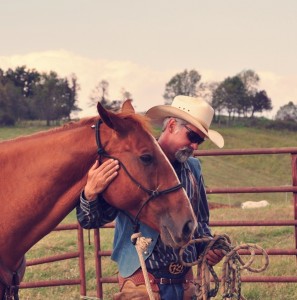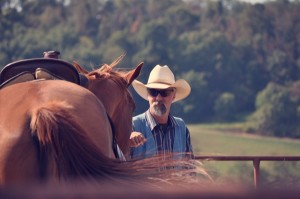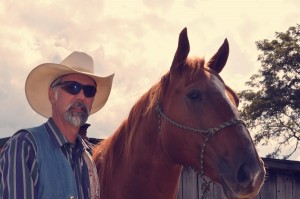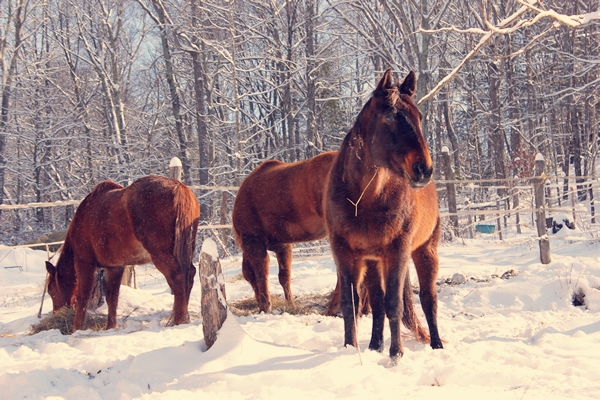Part 1
Christmas morning arrived. I awoke thinking about the forecast from the night before with its talk of wintry weather. I reached out from under the covers for the flashlight which sat atop the “currently active” pile of books on the nightstand. A small click and there was light, although I was thoughtful to keep some fingers over most of the lens to dampen the brightness.
The sliver of a beam revealed that the clock read 5:57. My wife Carol slept soundly on the other side of her equally zonked Rhodesian Ridgeback/English Mastiff cross dog, Teeney Weeney. Teeney acquired his misnomer due to being the runt of the litter. The had name stuck, even long after he outweighed a yearling heifer. Apparently he’d spent Christmas Eve acquiring territory the size of Montana, Wyoming, and Idaho in the middle of the bed.
 I quietly exited my sliver of mattress surface, territory the size of Delaware by comparison to the dog’s vast spread—then watched the sorry bugger stretch out and contentedly occupy that space, too. Slipping into a flannel shirt, jeans, socks, and a wool vest, I stepped carefully out of the bedroom, through a sitting room to the stairwell, downstairs, across the great room, outside to the front porch for an armload of firewood, back in, and over to the woodstove. The trip was complicated. Most of our five kids were home that year for Christmas along with a son-in-law and a couple of grandkids. The whole way I had tiptoed past bodies strewn on couches and air mattresses on the floor, and by sleeping dogs in various kennel crates everywhere, upstairs and down. Luckily, nobody had gotten stepped on and no dogs decided I was a dubious character.
I quietly exited my sliver of mattress surface, territory the size of Delaware by comparison to the dog’s vast spread—then watched the sorry bugger stretch out and contentedly occupy that space, too. Slipping into a flannel shirt, jeans, socks, and a wool vest, I stepped carefully out of the bedroom, through a sitting room to the stairwell, downstairs, across the great room, outside to the front porch for an armload of firewood, back in, and over to the woodstove. The trip was complicated. Most of our five kids were home that year for Christmas along with a son-in-law and a couple of grandkids. The whole way I had tiptoed past bodies strewn on couches and air mattresses on the floor, and by sleeping dogs in various kennel crates everywhere, upstairs and down. Luckily, nobody had gotten stepped on and no dogs decided I was a dubious character.
I cracked open the woodstove door. The coals lit up. A sizeable bank of charred wood remained from the night before. With a quick stoking it roared to life. The flickering light exposed the white pine Christmas tree reaching to the ceiling not far behind me. I turned briefly to admire it and noticed the mountain of wrapped packages piled underneath. It wouldn’t be long now….
The woodstove refueled, I ropewalked between an air mattress and dog crate and grabbed my outerwear from a rocking chair, pulled on my boots, and quietly slipped through the door into the tack/mud room. Cold air bit my uncovered face and hands. I lifted my thick leather shotgun chaps from where they hung on a saddle horn and smiled thinking that they were stiff enough from the cold to stand up on their own. Zipping them tightly around my legs, I finally headed out the door and peered around at the subtly dawning day.
It was snowing. Apparently flurries were just beginning to fall since the ground did not yet have a dusting.
“What an excellent way to start Christmas!” I thought, looking up at the myriad flakes whirling around.
I’m a white Christmas kind of guy, although I don’t mind reasonable weather for long stretches on either side of that special day. The wintry confetti falling from the sky seemed festive at first. Clouds loomed heavy and low to the ridge tops. Daylight was increasing in a diffused gray glow, but darkness draped the edges of the little clearing in the wooded ridge where our house stands.
“Snow clouds, for sure,” I thought. “This is setting in.”
With a spring in my step, I headed over to a stash of hay bales in a shed to start feeding horses. Then it happened so quickly…not half way across the yard the snow changed from a flurry of pleasant little flakes to more sinister, sharp ice pellets. They began pecking me in the face, stinging like blasts of icy bird shot as the wind whipped them in horizontal waves.
Our little farm is tucked away in the Appalachian Mountains of Virginia. An inverted horseshoe bend of the Little River—aptly named as it is just a stone’s throw wide through these parts—acts as one meandering border of the property. The other boundary lines ramble worse than the river. It makes me wonder how people ever concocted some ridiculous series of landmarks to get a piece of land with a plot that looks like an amoeba.
“I’ll give you from the old oak at the road, to the quartz rock in the corner of the pasture, to that place where old Kate threw a shoe when we were plowing that time, over to the Hickory there by the spring, then cut over to the river where I got the fishing line stuck in the tree and nearly caught a squirrel that time…” and that’s about the only way I can think of that these borders came to be. I could throw a cow pie at a barn side and have fewer wild edges in that splat than this place has.
But for all the creative and bewildering surveying that went into shaping this farm, I am grateful that it is nicely secluded. The river frontage is vast and isolated. The land has two ridges that fall to a central valley running through the middle of the amoeba, if there is such a thing. The original home place still stands down there—corrugated metal roof intact, old metal bed frames remain in their bedrooms, ragged clothes from the 1950s are strewn about, and buzzards roost in the upper and lower windows nowadays—and further down the valley a spring shoots out of a hillside from under a huge tree, improved more than a century ago with an alcove of dry laid river rock. It’s sparkling clear water still flows from a quartz channel.
When we first moved to this land there was nothing here besides the long abandoned, unlivable house and the spring along with 30 years of unbridle growth, mainly trees and thorny multifloral roses. We cleared a spot on a nice flat ridge with southern exposure for our homestead, a task accomplished with chainsaw and pickup truck, and the help of two Alpine goats, Boudreaux and Sancho. It is a particularly good spot for a homestead the way higher ridges, both on this property and at a distance on others, nearly encircle us breaking up the winds which howl in from North Carolina, Tennessee, West Virginia, and apparently at times the Arctic.
 In the early days, I collected the spring and fed the water into a ram pump I built from pipe fittings that delivered water to the home site, some 90 vertical feet up a hill, without any other energy input…no electricity or fuel. It was a pretty cool deal and worked okay for us during the first half decade we lived on the land and build our home and established our gardens, blueberries, and grape vines. We were off-grid with solar power for the first decade living here but eventually brought in grid power, dug a well, and got most of the sheetrock finished. It is this spring way down in a valley far from the house that is the key to how Jubal saved Christmas that year.
In the early days, I collected the spring and fed the water into a ram pump I built from pipe fittings that delivered water to the home site, some 90 vertical feet up a hill, without any other energy input…no electricity or fuel. It was a pretty cool deal and worked okay for us during the first half decade we lived on the land and build our home and established our gardens, blueberries, and grape vines. We were off-grid with solar power for the first decade living here but eventually brought in grid power, dug a well, and got most of the sheetrock finished. It is this spring way down in a valley far from the house that is the key to how Jubal saved Christmas that year.
Jubal and his bestest buddy, Festus—two big boned, sizable, ranch type American Quarter Horses—had been rescued out of El Paso, Texas earlier in the year. Jubal, a powerful sorrel with ginormous rounded muscles, a long blaze bisecting his face along a Roman nose, and ironically (since I’m Tom Moates) sporting a TM freeze brand on the right hind quarter, had come off a ranch in the Dakotas. Festus, a horse matched to Jubal in height and bone but by the time I first saw him not muscle, was a dark, nearly black, bay with an S Bar Lazy S hot branded on his left hind quarter; he had been a pack guide’s horse in Montana. These two had been purchased, paired up, and ridden from Canada to Mexico by a novice horseman from the U.K.
After a long story involving some fancy networking to get the duo here to Virginia, I’d begun working with them. Surprisingly, or perhaps not so surprisingly, both of these very experienced ranch/packing/long ride horses were terrified of ropes. I supposed wrecks involving ropes in the five months they trekked between North Dakota and Texas with an inexperienced rider had plenty to do with that. I’d been working mainly with Jubal since they had arrived because Festus required a long term recovery from a tendon injury he had sustained on that long journey. I’d spent time getting the sorrel gelding more settled around lead ropes and lariats, but at the time I was a complete novice myself when it came to roping.
By the time I had walked only fifty yards to the paddock closest to the house, the icy flurries had intensified. I threw a ration of hay over the fence to a couple geldings, Niji and Stoney. I took time to top out their water trough thinking if this weather knocked out the power later in the day I’d best have as much water stored up for them as possible.
The sleety snow kept up the quick crescendo as I walked over to the farm road and hopped in the pickup. Such an onslaught of wintry weather in so short a time got me thinking about my preparations in case this holiday wintry mix turned into a full blown blizzard. The gray gravel of the road already had begun to take on a white hue as I drove along it. I stopped at the upper end of the valley mentioned earlier and threw several piles of hay over a fence to a small herd of horses in a paddock there, including Jubal and Festus.
I returned to the pickup and continued to the furthest outpost of the property—a pasture near the entrance to the place with a roomy run-in shed that is home to Carol’s solitary and flashy Paint stallion, Chief. With his hay placed in the shed and water checked, I descended back into the valley and up the other side, the truck tires now cutting small tracks in the sleet and snow.
It being Christmas, before long the bustle of that special morning was underway. The kitchen, dining, and main living space in our house are all combined into one great room, and with everybody’s beds rolled up, this space was getting a big workout. The tree’s white lights twinkled like stars and it had some ornaments up high out of reach of the dogs. Homemade buttermilk biscuits came out of the oven and the smell of smoked bacon permeated everything. We have a huge table, and it proved barely large enough to accommodate the crew that morning. Everyone ate, breakfast was cleared, and the kitchen stayed busy with preparations for the afternoon feast. The winds were gusting steadily now, and the and ice estimates kept ticking upwards every time I checked the weather.
The timing was uncanny…just four hours after I’d awoken, we gathered to open presents and as the first one was being picked from under the tree, the tree went dark. The power was out. In these mountains back in hollers where only a few families live on farms, suffice it to say we’re not the main concern for power companies. One of the unique attributes of this place is that the only way in is a road cut into a hillside, about one and a half cars wide which I affectionately call “the gauntlet.” For a quarter mile it runs along an open ridge with hay fields on either side. With as little as four inches of snow, I’ve seen this road drift eight feet deep and we’ve been stranded back in here for more than a week before the state borrowed a snow blowing machine that looks like a combine to literally eat the snow drift and throw it out across the fields.
We got oil lamps and candles lit, opened presents, and the talk quickly turned to matters regarding the situation. Carol was perturbed because the Christmas day parade couldn’t be viewed, but otherwise she had the kids home and was content. The other adults began to think about being stranded in this wilderness and not making their scheduled departures and returns to work. As for me, I don’t mind a little bit of winter, or a white Christmas.
In fact, there is something cathartic about having the normal situations of life turned onto their heads. We go about everyday with light switches working and computers always at the ready and we expect them to be there always as natural elements of our lives, like the air we breath. Traveling about at will with our cars and planes is the same deal, but when something happens and the grid goes down or the roads become impassible or a volcano shuts down air travel, human constructed comforts suddenly can seem fragile and pretty puny in the big picture.
 In these moments we glimpse the greatness of the world around us and how small and powerless we truly are. I take some delight in the fact that we honestly control but little, and I enjoy being reminded of how foolish and grandiose we humans often are. There is something very settling to me when I’m faced with an overwhelming reality—little things like not being able to find a wrench I need or my e-mail program automatically updating to look nothing like it used to can cause me extreme distress, but life’s blizzards just calm me right down and I find a strange solace to them. There is an acceptance in the overwhelmingness of them that comes over me, and then I go about doing what little things I can do to help in such circumstances.
In these moments we glimpse the greatness of the world around us and how small and powerless we truly are. I take some delight in the fact that we honestly control but little, and I enjoy being reminded of how foolish and grandiose we humans often are. There is something very settling to me when I’m faced with an overwhelming reality—little things like not being able to find a wrench I need or my e-mail program automatically updating to look nothing like it used to can cause me extreme distress, but life’s blizzards just calm me right down and I find a strange solace to them. There is an acceptance in the overwhelmingness of them that comes over me, and then I go about doing what little things I can do to help in such circumstances.
“God’s voice is glorious in the thunder,” it says in Job 37. “We can’t even imagine the greatness of His power. He directs the snow to fall on the earth and tells the rain to pour down. Then everyone stops working so they can watch His power.”
Read the conclusion of this story on Monday 12/15


